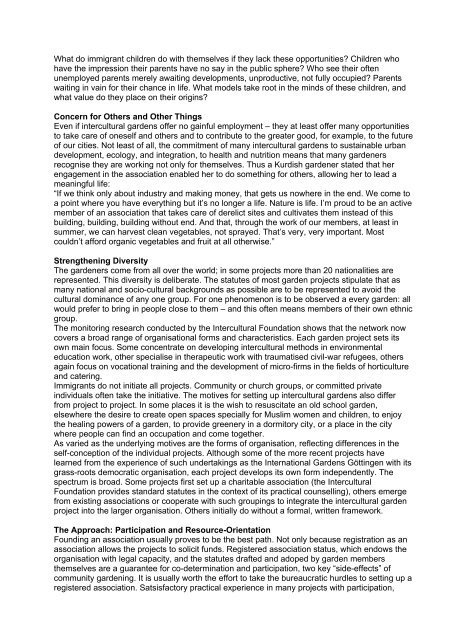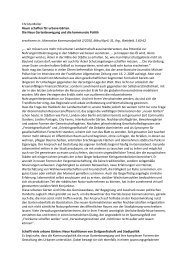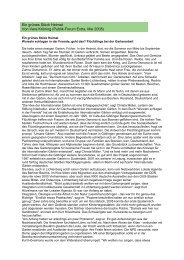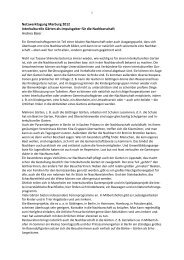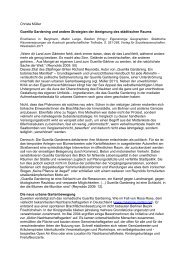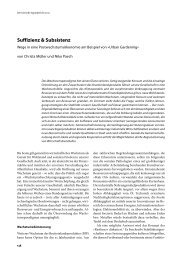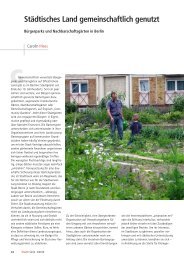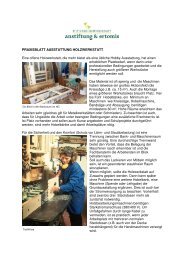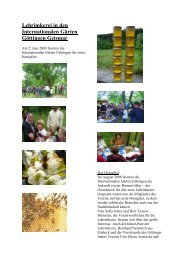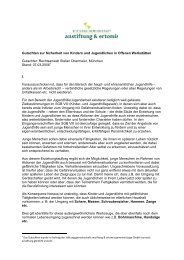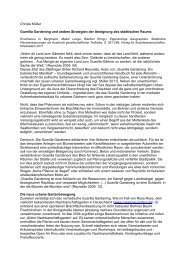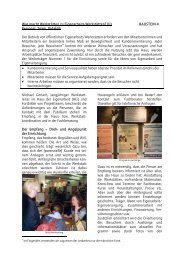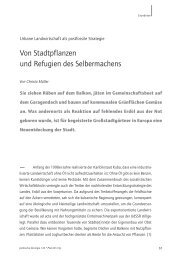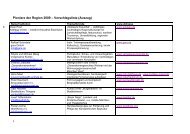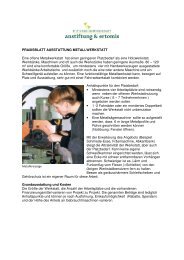Christa Müller - Stiftung Interkultur
Christa Müller - Stiftung Interkultur
Christa Müller - Stiftung Interkultur
Create successful ePaper yourself
Turn your PDF publications into a flip-book with our unique Google optimized e-Paper software.
What do immigrant children do with themselves if they lack these opportunities? Children who<br />
have the impression their parents have no say in the public sphere? Who see their often<br />
unemployed parents merely awaiting developments, unproductive, not fully occupied? Parents<br />
waiting in vain for their chance in life. What models take root in the minds of these children, and<br />
what value do they place on their origins?<br />
Concern for Others and Other Things<br />
Even if intercultural gardens offer no gainful employment – they at least offer many opportunities<br />
to take care of oneself and others and to contribute to the greater good, for example, to the future<br />
of our cities. Not least of all, the commitment of many intercultural gardens to sustainable urban<br />
development, ecology, and integration, to health and nutrition means that many gardeners<br />
recognise they are working not only for themselves. Thus a Kurdish gardener stated that her<br />
engagement in the association enabled her to do something for others, allowing her to lead a<br />
meaningful life:<br />
“If we think only about industry and making money, that gets us nowhere in the end. We come to<br />
a point where you have everything but it’s no longer a life. Nature is life. I’m proud to be an active<br />
member of an association that takes care of derelict sites and cultivates them instead of this<br />
building, building, building without end. And that, through the work of our members, at least in<br />
summer, we can harvest clean vegetables, not sprayed. That’s very, very important. Most<br />
couldn’t afford organic vegetables and fruit at all otherwise.”<br />
Strengthening Diversity<br />
The gardeners come from all over the world; in some projects more than 20 nationalities are<br />
represented. This diversity is deliberate. The statutes of most garden projects stipulate that as<br />
many national and socio-cultural backgrounds as possible are to be represented to avoid the<br />
cultural dominance of any one group. For one phenomenon is to be observed a every garden: all<br />
would prefer to bring in people close to them – and this often means members of their own ethnic<br />
group.<br />
The monitoring research conducted by the Intercultural Foundation shows that the network now<br />
covers a broad range of organisational forms and characteristics. Each garden project sets its<br />
own main focus. Some concentrate on developing intercultural methods in environmental<br />
education work, other specialise in therapeutic work with traumatised civil-war refugees, others<br />
again focus on vocational training and the development of micro-firms in the fields of horticulture<br />
and catering.<br />
Immigrants do not initiate all projects. Community or church groups, or committed private<br />
individuals often take the initiative. The motives for setting up intercultural gardens also differ<br />
from project to project. In some places it is the wish to resuscitate an old school garden,<br />
elsewhere the desire to create open spaces specially for Muslim women and children, to enjoy<br />
the healing powers of a garden, to provide greenery in a dormitory city, or a place in the city<br />
where people can find an occupation and come together.<br />
As varied as the underlying motives are the forms of organisation, reflecting differences in the<br />
self-conception of the individual projects. Although some of the more recent projects have<br />
learned from the experience of such undertakings as the International Gardens Göttingen with its<br />
grass-roots democratic organisation, each project develops its own form independently. The<br />
spectrum is broad. Some projects first set up a charitable association (the Intercultural<br />
Foundation provides standard statutes in the context of its practical counselling), others emerge<br />
from existing associations or cooperate with such groupings to integrate the intercultural garden<br />
project into the larger organisation. Others initially do without a formal, written framework.<br />
The Approach: Participation and Resource-Orientation<br />
Founding an association usually proves to be the best path. Not only because registration as an<br />
association allows the projects to solicit funds. Registered association status, which endows the<br />
organisation with legal capacity, and the statutes drafted and adoped by garden members<br />
themselves are a guarantee for co-determination and participation, two key “side-effects” of<br />
community gardening. It is usually worth the effort to take the bureaucratic hurdles to setting up a<br />
registered association. Satsisfactory practical experience in many projects with participation,


